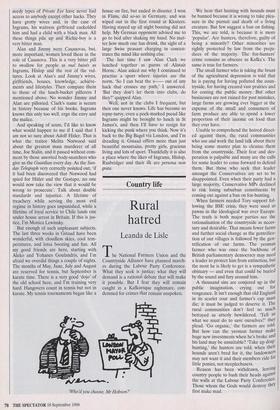Country life
Rural hatred
Leanda de Lisle
The National Farmers Union and the Countryside Alliance have planned march- es during the Labour Party Conference. What they seek is justice; what they will demand is a rational debate that will make it possible. But I fear they will remain caught in a Kafkaesque nightmare, con- demned for crimes that remain unspoken.
Who'd you choose, Mr Hobson?'
We hear that hunting with hounds must be banned because it is wrong to take plea- sure in the pursuit and death of a living creature. But few suggest a ban on fishing. This, we are told, is because it is more `popular'. Are hunters, therefore, guilty of being a minority? Other minorities are rightly protected by law from the preju- dices of the majority. The fox-hunters' crime remains as obscure as Kafka's. The same is true for farmers.
The small farmer who is taking the brunt of the agricultural depression is told that he is paying for having polluted the coun- tryside, for having created vast prairies and for costing the public money. But other businesses are not ruined for past mistakes, large farms are growing ever bigger at the expense of the small and consumers of farm produce are able to spend a lower proportion of their income on food than they ever have.
Unable to comprehend the hatred direct- ed against them, the rural communities who use and work the land talk about there being some master plan to cleanse, them from the countryside. Their fear and des- peration is palpable and many are the calls for some leader to come forward to defend them. But those who seek that leader amongst the Conservatives are set to be disappointed. Even when their party had a large majority, Conservative MPs declined to risk losing suburban constituents by coming out against a ban on fox-hunting.
When farmers needed Tory support fol- lowing the BSE crisis, they were used as pawns in the ideological war over Europe. The truth is both major parties see the rationalisation of the countryside as neces- sary and desirable. That means fewer farms and further social change as the gentrifica- tion of our villages is followed by the gen- trification of our farms. The yeoman farmer who was once the backbone of British parliamentary democracy may need a leader to protect him from extinction, but the most he is likely to get is a sympathetic obituary — and even that could be buried by the sound and fury around him.
A thousand sins are conjured up in the public imagination, crying out for vengeance. It isn't enough that old England in its scarlet coat and farmer's cap must die; it must be judged to deserve it. The rural communities don't feel so much betrayed as utterly bewildered. 'Tell us what we must do to save ourselves?' they plead. `Go organic,' the farmers are told. But how can the yeoman farmer make huge new investments when he's broke and his land may be unsuitable? 'Take up drag hunting,' the hunters are told, when their hounds aren't bred for it, the landowners may not want it and their members ride fat little ponies, not steeplechasers. Reason has been withdrawn, leaving country people to bash their heads against the walls at the Labour Party Conference. Those whom the Gods would destroy they first make mad.


























































































 Previous page
Previous page